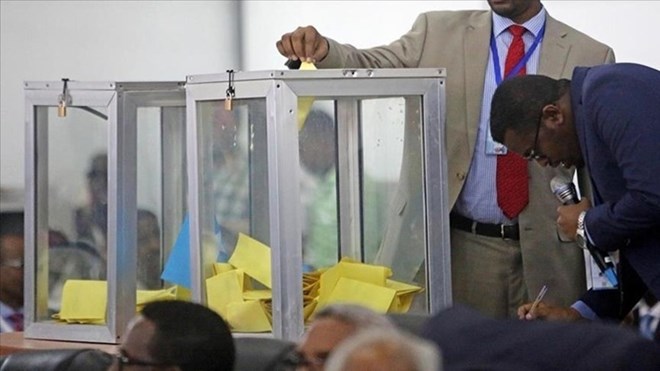Sunday March 30, 2025
By Ali Halane

FILE - A Member of Parliament casts a vote during Somalia’s indirect election in 2022. Despite calls for direct elections, the country’s political divisions and security challenges have made it difficult to move beyond the current system of indirect voting.
The slogan of "conducting free and fair direct elections" has been repeatedly voiced by Somali officials since 2009, alongside other ambitious projects such as "completing the constitution" and "eliminating terrorism." However, after 15 years, none of these aspirations have been fully realized.
These issues are deeply interconnected and cannot be separated. Completing the constitution hinges on achieving political consensus among Somali stakeholders, while conducting direct elections depends on eliminating armed groups that control significant parts of the country. Both require political reconciliation—or, more precisely, political consensus.
The call for "direct elections" has resurfaced strongly under President Hassan Sheikh, resonating among members of the current government and its supporters. Some have even treated it as an unquestionable objective. Yet, despite this enthusiasm—whether driven by genuine conviction or political opportunism—the reality is that the necessary groundwork has not been laid, at least not under the current circumstances.
Politically, Somalia remains deeply divided. Open disputes persist between the federal government and two states (Jubaland and Puntland). Additionally, latent tensions exist between the federal government and the other three states, which, though not yet public, could erupt at any moment.
On the security front, it is widely acknowledged that the federal government has not yet succeeded in liberating the country from Al-Shabaab's grip. Consequently, "direct elections" could only be conducted in very limited areas if held today.
Members of the current bicameral parliament also harbor significant concerns about their uncertain future if direct elections were to be implemented. Many prefer to maintain the status quo, which allows them to return to their seats in the same manner as in previous (indirect) elections.
Notably, most parliamentarians voted for the controversial constitutional amendments—not out of conviction, but to align with the president’s directives.
There is no debate about the importance of direct elections as a potential solution to the struggle for power. However, conducting direct elections in Somalia under the current conditions risks leading to violence and instability.
Direct elections are not a magical solution that will instantly resolve Somalia's problems. Instead, they represent a long-term goal that can only be achieved gradually over generations.
Perhaps the best course of action is to experiment with direct elections on a smaller scale and develop them step by step until they are properly established. The current rhetoric from officials and politicians, however, amounts to little more than hypocrisy and the promotion of false hopes.
The country is not yet politically, tribally, or socially prepared for direct elections. Therefore, improving the clan-based power-sharing system (the 4.5 formula) may be the most suitable interim solution for Somalia's current circumstances.
It must also be noted that the majority of individuals in executive, legislative, and judicial positions, as well as those seeking power at both the federal and state levels, lack the qualifications and credibility necessary to oversee free, transparent, and fair elections.
While the idea of direct elections in Somalia is ambitious, it lacks a realistic foundation given the ongoing political divisions, security challenges, and the absence of national consensus. Without addressing these fundamental issues, this vision remains more of an illusion than a reality.
Ali Halane is a Somali journalist, researcher specializing in African and Middle Eastern affairs, and co-founder of the Somali Cultural Parliament. He can be reached at [email protected].